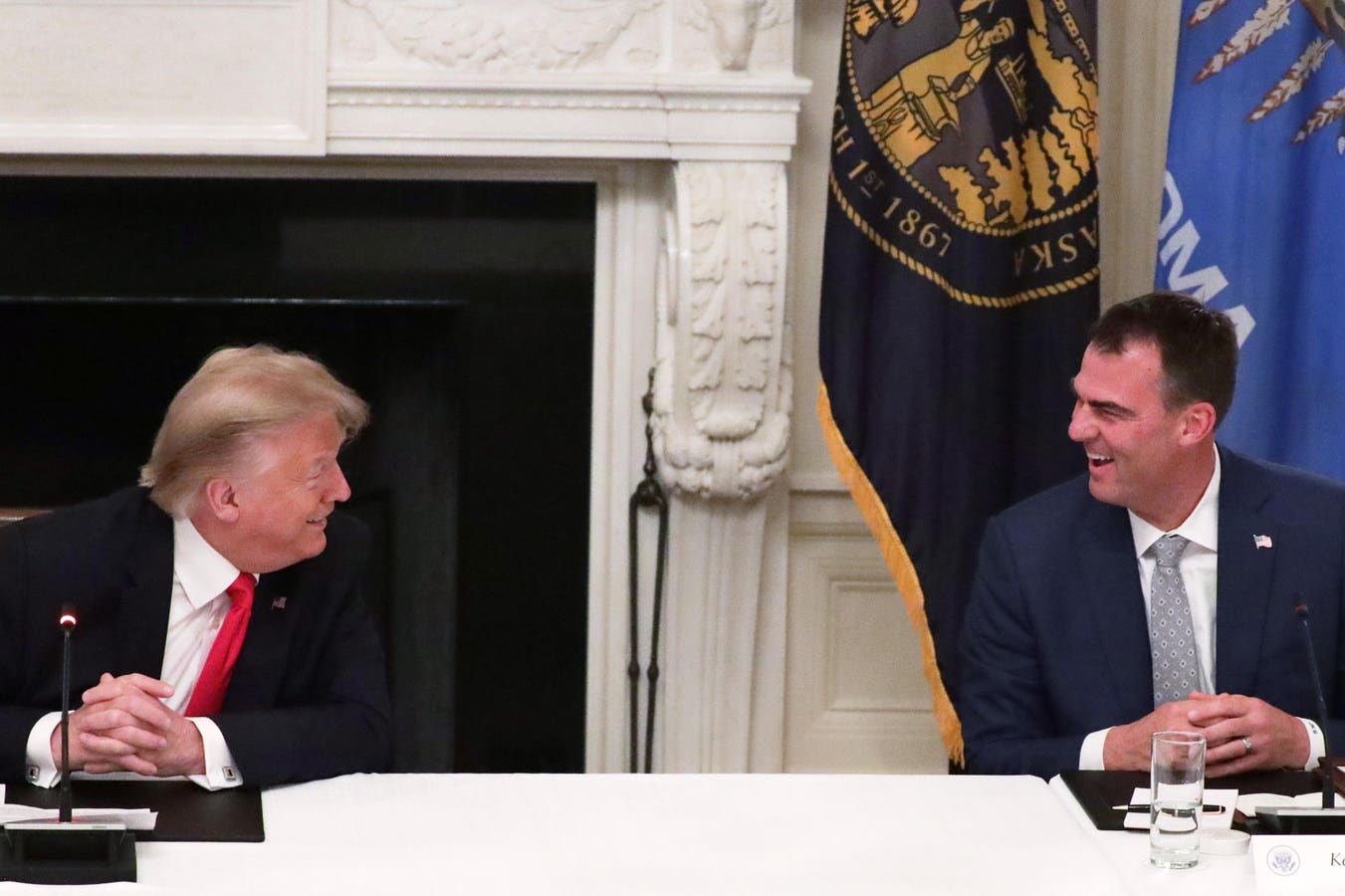WASHINGTON, DC – JUNE 18: U.S. President Donald Trump listens as Governor Kevin Stitt (R-OK) speaks … More during a roundtable at the State Dining Room of the White House June 18, 2020 in Washington, DC. President Trump held a roundtable discussion with Governors and small business owners on the reopening of American’s small business. (Photo by Alex Wong/Getty Images)
Getty Images
President Trump’s efforts to reduce the size of government and improve the federal regulatory process are getting plenty of attention, but he is not the only one with these goals. In states across the country, legislators and governors are taking steps to improve their regulatory environments. If done well, these reforms should make it easier for people to start and operate businesses, which will create jobs and boost economic growth.
The federal Department of Government Efficiency, or DOGE, is trying to streamline federal agencies by eliminating redundancies, modernizing technology, and simplifying processes so government better serves taxpayers. In the same spirit, dozens of states are implementing their own versions of DOGE. In Oklahoma, Governor J. Kevin Stitt created a Division of Government Efficiency led by an advisor who reports directly to him. The Division is tasked with identifying wasteful spending to make Oklahoma a top state to do business. So far it has identified over $19 million in potential savings and more than 67,000 hours of potential time savings.
In Florida, Governor Ron DeSantis created an Executive Office DOGE team to identify and report on unnecessary spending across the state, including within the state’s university system and local governments. Several other states have similar initiatives, including Indiana, New Hampshire, Iowa, and Missouri. The specific goals of each effort vary, but all of them are trying to capture the momentum from last year’s election when voters expressed their desire to reduce the size and scope of government.
DOGE-style initiatives are not the only way states are trying to reduce the costs government imposes on entrepreneurs. Many laws today are written in vague language that omits important details. The details are then filled in by the agencies tasked with implementing and enforcing the laws, and the resulting regulations largely determine what is allowed under the law. As Kansas State Representative Barbara Wasinger put it “Bureaucrats have become the legislators, they legislate by regulation”.
On the surface, leveraging agency expertise makes some sense. After all, we may get better laws if those with the most knowledge design them. The problem is that state constitutions empower legislatures to make laws, not agencies. As James Maddison warned us, letting the groups that enforce the laws also write the laws is a step towards tyranny.
This delegation of lawmaking is also a plausible reason we have so much regulation in this country. Agencies are less accountable to voters than legislators, and their whole reason for being is to regulate. If they are not actively monitored by legislators who are directly accountable to voters, agencies are likely to overregulate.
To limit this delegation of authority, Wyoming and Utah have followed Kansas in passing legislation that requires lawmakers to analyze and approve regulations that are projected to have a significant impact on their states’ economy. These laws are modeled after the federal Regulations from the Executive In Need of Scrutiny Act, or REINS Act. The hope is that lawmaker oversight will force agencies to thoroughly consider the costs and benefits of regulations. If agencies advance regulations that do not make sense, lawmakers can revoke them.
Several other states are considering similar REINS-style laws, including West Virginia, Georgia, Oklahoma, South Carolina, and Ohio.
While the jury is still out on how effective the DOGE-style initiatives and laws to improve legislative oversight of regulations will be, there are reasons to be optimistic. Dozens of studies show that too much regulation reduces job creation, wages, and entrepreneurship while increasing prices and poverty. Even worse, the negative impacts of regulation are most acutely felt by small businesses. According to one recent study by economists Dustin Chambers, Patrick A. McLaughlin, and Tyler Richards, an increase in regulation reduces the number of big and small firms but only reduces employment in small firms. They also find that consecutive years of high regulatory growth amplify the negative impact on small firms. Their findings are consistent with the theory that regulation often benefits large, established businesses at the expense of smaller upstarts that lack the resources and staff to comply with numerous and complicated rules.
Reducing regulation should reduce these harmful effects and stimulate job growth, especially among small businesses that are the backbone of many communities.
There is widespread bipartisan agreement that the United States is overregulated. It is too hard to build housing, roads, and power plants. Labor regulations like occupational licensing rules prevent people from finding meaningful work. Environmental regulations often prevent us from helping the environment. States that reduce regulation, improve their regulatory processes, and cut government waste will help make America a place where things get done again.
